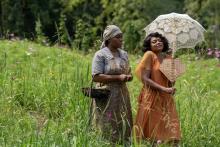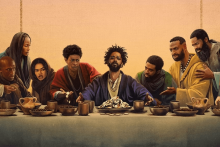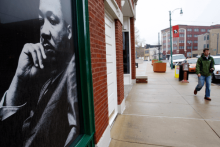Opinion

On Sunday, I tuned in to watch my first football game in over a year as part of my discipline toward Christian nonviolence. That may seem odd, especially since I’m the person who wrote about quitting the NFL as an act of nonviolence just last year. But this weekend I tuned in for the NFL’s Pro Bowl competition, including the flag football game, to signal my support for player safety and wellbeing.

I’m a historian and a religious studies scholar who recently published a book exploring the role of religion in political movements such as anti-abortion campaigns. Historical evidence can help identify trends that will likely influence the mix of religion and politics in the year ahead.
From my perspective, three key trends are likely to show up in 2024.

Payne details the creation, proliferation, and decline of CCM, tracing the industry’s relationship with conservative evangelical Christianity.

This week the House voted with a resounding margin of 357 to 70 to pass a bill that includes support for low-income families with multiple children. If passed in the Senate, the “Tax Relief for American Families and Workers Act” will enhance the Child Tax Credit by expanding eligibility and adjusting payments for inflation, provisions that would benefit about 16 million children in families with low income, lifting 400,000 children above the poverty line.

As far as coming-of-age stories go, Percy Jackson and the Olympians, a new Disney+ streaming series, is certainly an earth-shattering one

More than 23 years after the box office hit Chicken Run came out, Aardman Animations has finally released a sequel: Chicken Run: Dawn of the Nugget is a punny, thrilling, and slightly disturbing homage to the art of claymation, with abundant lessons about collective liberation, trauma, and parenting.

In July of last year, an estimated 50,000 fans flooded Arrowhead Stadium in Kansas City to see Taylor Swift’s Eras Tour concert. Among those in the crowd was football tight end Travis Kelce, eager to woo Swift. Arrowhead has been central to Swift and Kelce’s romance ever since: After making their romance official last September, Swift has routinely joined the 76,000 Chiefs fans to cheer for Kelce and his teammates. From concertgoers to sports spectators, the thought of that many people in the same space is difficult to imagine. Equally hard to imagine, and significantly more heartbreaking, Israel Defense Forces have killed 25,000 Palestinians since Oct. 7, 2023; that number of people would fill about a third of Arrowhead Stadium.
This is a jarring image, but such is the reality of our present moment: While the state of Israel carries out a genocide against Palestinians, we are easily distracted by our adoration for Swift and Kelce, along with spectator sports.

In her support of Icke and Rowling, Walker seems to have lost sight of her own claims about God and humanity that are revealed in The Color Purple and other works.

The prevailing public narratives we have used to justify military strategies amid diplomatic fantasies are being exposed as meaningless: Unfettered Israeli military power can never impose a lasting solution nor quench Palestinian aspirations for sovereignty and justice. Likewise, Palestinian armed factions can never defeat Israel’s military power, backed by the unequivocal support of the U.S. These exclusionary self-vindicating visions dominate in a completely zero-sum game. Escalating violence wantonly kills, intensifying the compulsion to eradicate the human dignity of the “other.” In short, there is no military solution to the raging warfare spilling over our screens and tearing our hearts asunder.

On my first trip to Cuba in 2022, I met Jorge González Nuñez, president of the Movimiento Estudiantil Cristiano de Cuba (MEC). I asked how he would describe the situation the Cuban people were living in, impacted by the U.S.’ decades-old trade embargo and other policies introduced by the administrations of former President Donald Trump and President Joe Biden, from a theological perspective. His answer stuck with me.
“The Cuban people are going through a crucifixion,” he said without hesitation. “It is hard to have hope.”
He paused and then added, “But there is resurrection.”

Director Jeymes Samuel’s newest movie, The Book of Clarence, is not just a biblical epic but a Black biblical epic.

The Von Erichs believed in the salvific power of both faith and wrestling.

No Christian leader has influenced my faith and activism as much as Rev. Martin Luther King Jr. — but the day we devote to his legacy often leaves me frustrated. There’s a bitter irony in a nation that takes a day off to celebrate King’s life and work while that same nation is experiencing a deep backlash against racial justice.

According to recent polling from the Washington Post and the University of Maryland, Republicans are now “more sympathetic to those who stormed the U.S. Capitol and more likely to absolve Donald Trump of responsibility for the attack than they were in 2021.” The same polling found that Americans were now slightly less likely to believe that President Joe Biden’s win was legitimate and more likely to believe there was “solid evidence” of voter fraud.

In October of last year, 33 states sued Meta, the parent company of Facebook, Instagram, and WhatsApp, alleging that the company has “concealed the ways in which these Platforms exploit and manipulate its most vulnerable consumers: teenagers and children.” The lawsuit further alleges that the company “repeatedly mislead the public about the substantial dangers of its Social Media Platforms.” The most recent lawsuits make it clear that churches, that are operating large numbers of social media accounts, must do some soul-searching about whether they should stay on platforms that are causing harm to young people.

For many Christians in the West, Advent is a time of preparation infused with prayer, anticipation, and reflection. This year, Advent is painfully marked by more than 18,000 Palestinian deaths — including more than 7,000 children — as a result of Israel’s brutal military retaliation for the Oct. 7 Hamas attack. But the violence stretches beyond the borders of Gaza and the West Bank.

My first experiences of Christian sacraments, including baptism and the Eucharist, were mysterious and somewhat confusing. As a Catholic little girl, I didn’t remember my infant baptism and could never quite wrap my head around eating Jesus’ flesh and drinking his blood. What’s more, these solemn events happened within the confines of a giant, cavernous church — a place where I had to be still, quiet, and serious. During weekly Mass, I learned implicitly from the nuns that reverence and fun do not go together.

Minus One, which premiered in U.S. theaters on Dec. 1, became the highest grossing Japanese live-action film in U.S. history.

Each book, whether subtly or overtly, shows readers how to build community in the face of both real and existential danger.

In a televised interview this week with Sean Hannity of Fox News, former President Donald Trump initially refused to answer the question of whether, if elected in 2024, he would be a dictator or use his power to seek retribution for his political opponents. After Hannity pressed further, Trump said he would only be a dictator on “day one” of a new presidency; he did rule out political retribution. This should be shocking, but are any of us surprised? Trump is known for his lying and exaggeration. Nevertheless, we make a grave mistake if we don’t take Trump’s words seriously.